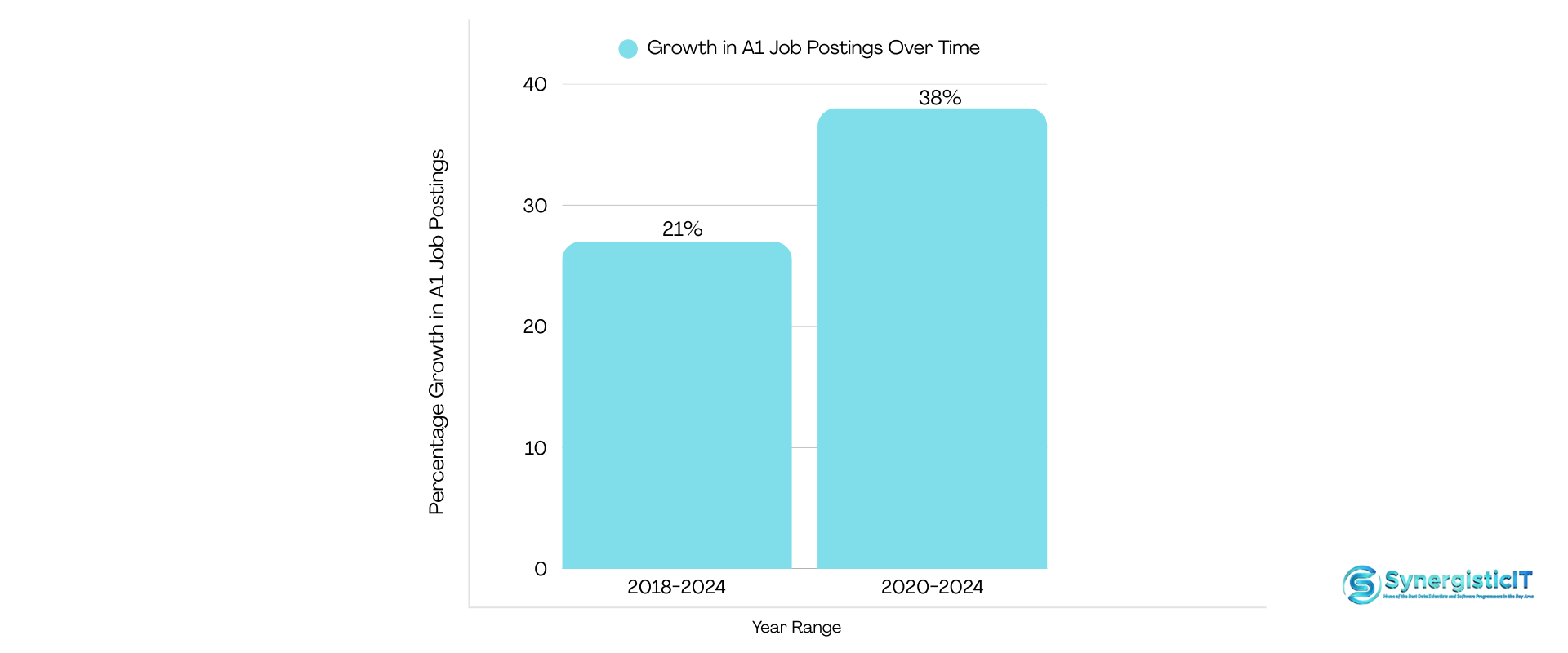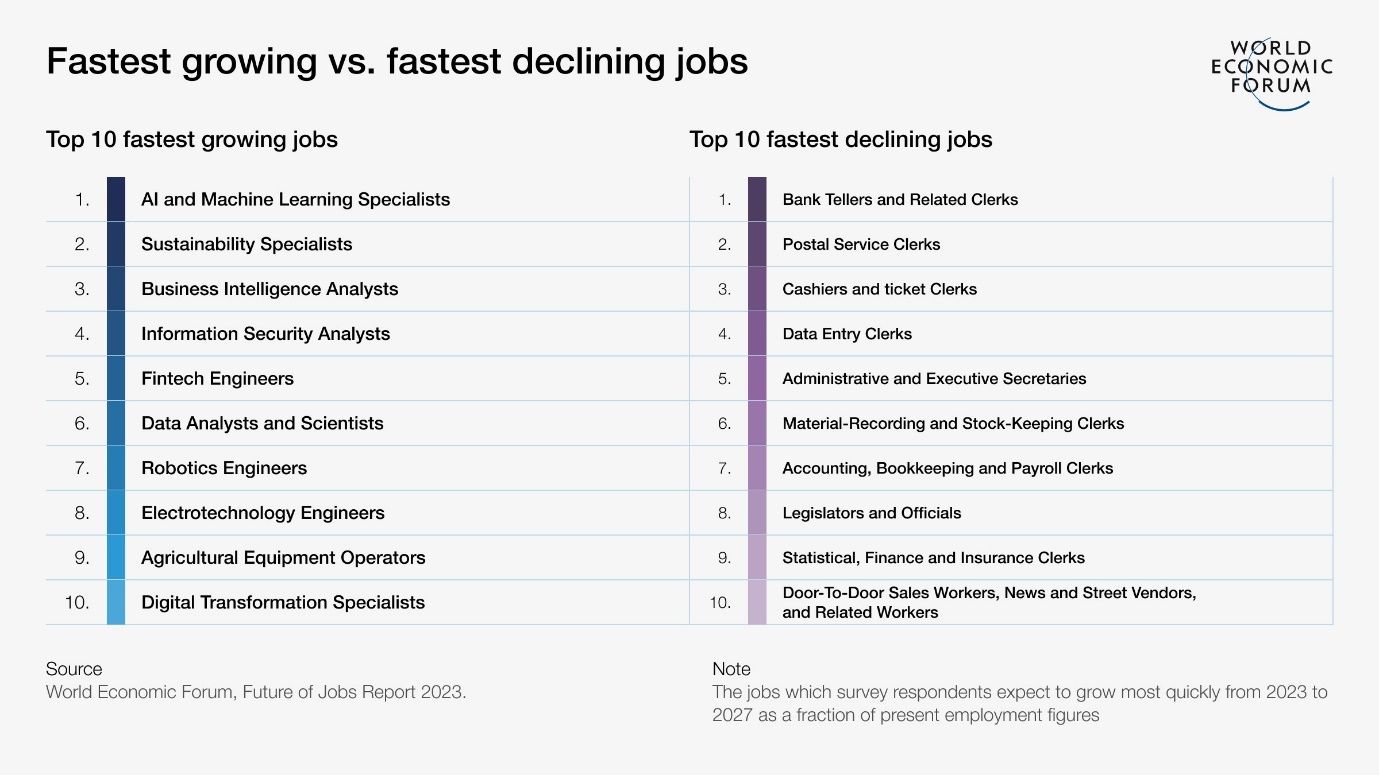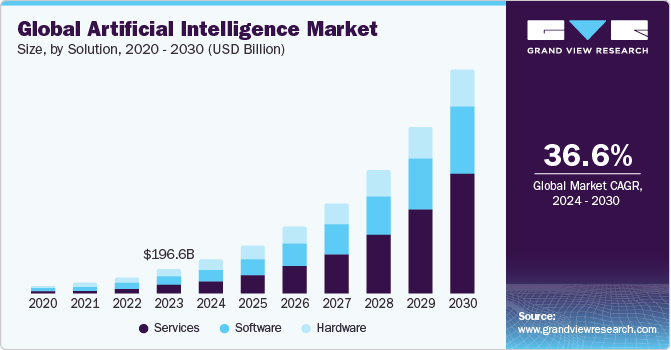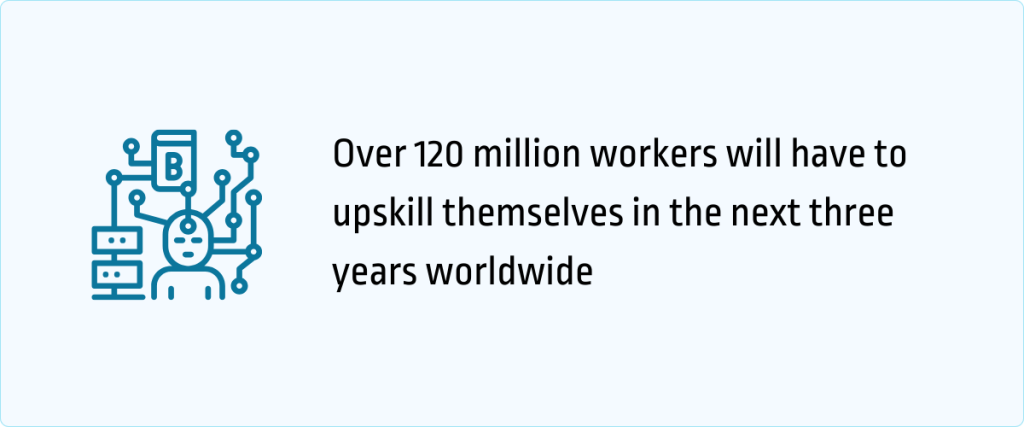The job landscape is changing extremely fast. Advancements in technology, particularly in artificial intelligence, robotics, and machine learning, are redefining job roles across industries. According to the 2025 LinkedIn Future of Work Report, jobs in AI went up by 38% from 2020 to 2024, making it the fastest-growing field. In this blog learn the Impact of AI on Jobs and how to get Hired for AI jobs. As AI evolves, it will transform the traditional job landscape and create new jobs like AI ethicist or AI engineer. So, if you are thinking about a lifelong career, you need to think ahead and prepare for the evolving job roles of the future.
In this blog, we will explore the role of artificial intelligence in jobs and how, as a jobseeker/professional, you can prepare for these changes.
Role of AI in Replacing Existing Jobs
AI can automate most redundant and repetitive tasks. This quality makes it great to achieve operational efficiency, however, it also raises concerns about unemployment.
A study by the University of Oxford has predicted that nearly 47% of US jobs could be automated by AI over the next two decades. This prediction suggests that in the coming times, AI will change the job market, and skill-focused roles will become more important.
So, which jobs will AI impact the most?
- Entry-level programming jobs: AI can easily do basic coding or programming and will no longer require programmers with basic coding skills. However, advanced coding skills will still remain irreplaceable.
- Data entry clerks: As AI can quickly and accurately input data into systems, data entry clerk positions have already started declining.
- Customer service: While not completely, customer service agents are now being partially replaced by AI chatbots that can easily provide basic support. Only for advanced support, such as troubleshooting, personal assistance is required.
- Admin assistants: There are many tools and apps that one can use to schedule meetings, organize notes/tasks, manage emails, and more, which previously needed human assistance.
Other job roles that are seeing a decline due to AI are Legal Assistants, Drivers, cashiers, and accountants.
Which jobs will be immune to the AI revolution?
AI is useful in many areas, but not in jobs that require human judgment, communication, and decision-making. These jobs will remain unchanged in the AI-driven job market. Some examples may include trainers, marketing and strategy specialists, business development professionals, engineers, etc.
New Job Categories Created By AI
Due to AI, many new job categories are being created and will be formed in the future. Most of these categories will demand highly specialized skills in AI, robotics, natural language processing, and machine learning.
Here are the areas where you will see growth and the creation of new jobs.
AI Development & Maintenance
- Machine Learning Engineers: Design and implement algorithms to support automation in different industries.
- AI Researchers: Explore and develop new AI methodologies and technologies.
- Data Scientists: Analyze complex data to discover meaningful insights and train AI models.
- Data Labelers and Annotators: Prepare and label data to train AI systems effectively.
- AI Hardware Specialists: Develop and optimize hardware components tailored for AI computations.
- Environmental Data Analysts: Apply AI to analyze environmental data, helping in conservation efforts and monitoring climate change.
Human-AI Collaboration
- Human-AI Interaction Designers: Ensure people can use AI systems easily and effectively.
- Robotics Operators: Manage and collaborate with robots in sectors like manufacturing and logistics.
- Human-in-the-Loop AI Specialists: Integrate human feedback into AI systems to enhance accuracy and reliability.
AI Training & Support
- AI Trainers: Teach AI systems to understand and respond as per the feedback.
Education & Academia
- AI Educators: Develop educational content and curricula focused on AI.
- Trainer: Help students or professionals learn new subjects or skills.
Legal & Ethical Oversight
- AI Cybersecurity Analysts: Use AI to quickly find and deal with cybersecurity threats to keep systems safe.
- AI Ethicists: Examine the moral implications of AI deployments and develop ethical guidelines.
- AI Legal Consultants: Specialize in legal issues related to AI, including data privacy and compliance.
Healthcare & Medical Analysis
- Medical Data Analysts: Utilize AI to analyze medical data, such as MRI images and genomic sequences, to improve patient outcomes.
Marketing & Business Intelligence
- AI Marketing Analysts: Use AI to understand market trends and how customers behave, so businesses can make smart decisions.
Industries Impacted Most By AI
Healthcare
Healthcare has seen a 40% increase in job postings for AI. AI is helping doctors and nurses by making diagnoses faster and more accurately. It can study medical records, scan images, identify health risks early, and suggest treatment plans. This has created a demand for professionals who understand both medicine and AI.
Finance
Banks and financial companies are using AI to prevent fraud, predict stock trends, and help customers make smarter financial decisions. That’s why companies are hiring data analysts and software engineers to build and improve those systems.
Customer Service
AI tools like chatbots and virtual assistants have improved customer service by giving accurate responses in significantly less time than humans. These tools can handle common questions and provide suggestions and solutions.
Manufacturing
With AI-enabled robotic arms and other manufacturing bots, tasks like assembly and stacking have become easier. Also, predictive analysis sensors help keep equipment working without lags.
Retail
Retail companies have seen a 35% increase in AI-related job postings since 2020. From recommending your perfect product to sending shopping reminders, everything is done with the help of AI. AI tools help manage inventory, analyze customer behavior, and personalize and simplify the shopping experience.
Benefits of Increasing AI Jobs
1.More Skills = High Salaries
As the AI jobs category is still developing, you may get the advantage of entering early. AI jobs are some of the highest-paying, and with the right AI skills, you can get the best salary in the market. A study reveals that machine learning engineers saw a 15% yearly salary increase between 2019 and 2024. This increase is faster than most other tech roles.
2. Secure Career
The U.S. Bureau of Labor Statistics projects that AI careers will increase by 21% from 2021 to 2031, surpassing many other sectors. The global investments in AI research are also growing, which means more jobs will be created. So, learning AI skills today means you will have a secure career in the future.
3. Career opportunities
AI professionals are needed across industries, be it healthcare, marketing, tech, or manufacturing. By combining AI skills with your domain knowledge, you can get more career opportunities in your field.
4. Career growth
AI is full of possibilities. According to McKinsey’s Workforce Transformation Report (2024), companies that have adopted AI are developing new products 30% faster than others. This means you have more chances to grow your career by innovating.
Top Skills of the Future
According to the World Economic Forum’s 2025 Future of Jobs Report, to stay competitive and relevant in the AI-driven job market, you must consider learning the following skills.
- Analytical thinking
- AI and big data
- Networks and cybersecurity
- Technology literacy
- Creative thinking
- Resilience
- Flexibility and agility
- Curiosity and lifelong learning
As AI takes over tasks that don’t require much thinking, soft skills become more important. A McKinsey & Company study has found that jobs that need social and emotional skills will grow by 24% by 2030, while jobs needing physical or manual skills will decline.
How can you prepare for the job changes created by Artificial Intelligence?
Artificial Intelligence is a great technology and will be used more in the future across industries. Those industries that have not adopted it today will adopt it in the future. But artificial intelligence is a two-edged sword. While it will end some jobs, it will create more too.
So, you need to think two steps ahead and be ready to adjust to the changes made by AI. Here are some ways you can cut through the AI-affected complex job landscape.
Continuous Learning
As part of the tech industry, you must know the importance of continuous learning already. Technology changes fast, imagine we had bulky desktops, CPUs, decade ago, and now they are all replaced by compact laptops, tabs, and smartphones. So, if you want to remain valuable, you need to keep up with the progress made in your field. Even the World Economic Forum report says that half of the workforce will need to learn new skills to stay relevant. So, make sure you are ready to embrace the changes and level up by learning new skills.
AI Literacy
AI continues to affect every industry, making AI literacy critical to stand out. Those employees who have an understanding of AI tools and platforms and know how to integrate them into their daily workflows have an edge over those who don’t. So, instead of seeing AI as a villain, consider it as a tool to improve your performance and pay scale. As the demand for professionals is high compared to the existing AI professionals, you have an advantage to command a higher salary with AI literacy. No matter what profession you are in, combine data analytics and AI skills to make yourself more valuable.
Get Specialized Training
For jobs that are being created in AI, you need specialized skills. Data reveals that nearly 50% of employers can’t find enough people with strong AI skills. That means there are plenty of job openings, but not enough specialized professionals to fill them. So, taking extra training or getting a certificate in AI is a good way to prepare for AI jobs.
Diversify skills
Employers around the world look for candidates who have broader skill sets, like someone who not only knows how to manage data but also how to use machine learning to use data efficiently. Instead of just learning one skill, try to pick up different skill sets across a domain. Having multiple skill sets will give you the flexibility to switch between different roles. For example, learning skills like Database Modelling, Data Warehousing, and Data Processing will make you suitable for almost all data-related job roles like data scientists, data analysts, data engineers, etc.
Build Soft Skills
According to the World Economic Forum’s Future of Jobs Report (2023), 6 out of the top 10 most in-demand job skills are soft skills like analytical thinking, creativity, emotional intelligence, resilience, and leadership. The reason — machines can be smart, but they can never replace human emotions and creativity that they bring. An AI tool can help automate mundane tasks, but only with human skills out-of-the box solutions, and real-life problem solving is possible.
For instance, AI may replace some of the mundane tasks like writing code, but for delivering the project and putting everything together, you need soft skills like communication, collaboration, and teamwork. So, make sure you focus on building soft skills that’ll make you valuable.
How Do SynergisticIT Skill Enhancement Programs Help?
Skill enhancement is the need of the hour. Due to unprecedented advances in technology, the job market is seeing many changes. No one is immune to job displacement. Impact of AI on Jobs and Jobseekers is becoming more and more noticeable. . Even those who have degrees or experience need to gear up to make themselves ready for these changes.
Companies, too, are looking for candidates with strong AI/ML/data skills to help them stay competitive. However, there is a big gap between the number of jobs and the candidates with the right skills. For over a decade, SynergisticIT has been working as a bridge to help clients and job seekers connect. Our skills enhancement programs are a way for clients to find highly skilled candidates and for job seekers to get lucrative jobs.
Our courses combine multiple skills in high-demand areas like Full-stack, Cloud computing, AI, machine learning, and data science, so that job seekers can
- have more career flexibility and can choose the roles they like.
- become more valuable to the companies.
- are suitable for high-paying, specialized roles.
According to Glassdoor and LinkedIn, jobs like Cloud Engineer, Full-Stack Developer, and ML/AI Engineer are among the top-paying tech jobs in the U.S, offering $100K or more annually.
Here’s how the program positions candidates for a secure career.
Real Skills for Future Jobs
Keeping the sudden rise in AI/ML-related postings in mind, our programs cover these technologies in length and breadth. We help our candidates get a well-rounded, deep knowledge of the high-demand skills like Machine learning, Python programming, Data analysis, AI, and Cloud computing so that they are job-ready.
Hands-On Learning
Learning from textbooks is old school. Real-world situations require practical learning. To help candidates feel confident about their skills, we help them learn through real-world applications and capstone projects. If you are doing data science, you will not only learn the theory of data science but also how to analyze real data using AI and ML tools.
Job placement
Learning the skills is not enough, as many skilled candidates are struggling to find a suitable job. Data reveals 75% of resumes are rejected by Applicant Tracking Systems (ATS) and only 2–3% of resumes result in an interview. These stats are proof that strong resume and interviewing skills are as important as tech skills. Our career experts help students build strong resumes, interview skills to help them stand out. Moreover, we market our candidates to our clients, ensuring they can get a job faster.
Conclusion
History is full of examples of technological advancements, and they have had more positive impact than negative. When machines came, they boosted production. When computers came, they saved time and resources. These developments did reduce some jobs, but they also created new opportunities. Like, when automation replaced manual labor, it created the need for technicians, engineers, and IT professionals.
You should also not see the demand for new skill sets because of AI as a threat, but as an opportunity for growth. By investing in developing strong technical and soft skills, you can be a critical part of the AI-driven workforce.
Since 2010, SynergisticIT has helped 1000’s of job seekers thrive in the tech industry. At SynergisticIT, we make candidates work on technologies and skills our clients demand.
Our unique approach goes beyond training, offering hands-on project experience. We also have a marketing team to promote your skills, so you don’t have to. Check out our candidate outcomes page to see the success stories.
We also participate in industry events like Oracle Java One and the Gartner Data and Analytics Summit, offering excellent opportunities for brand recognition during your job search. Be sure to watch our event videos for more insights.
SynergisticIT at Gartner Data and Analytics Summit 2023 (wistia.com)
SynergisticIT at Oracle Cloud World, Las Vegas 2023 (wistia.com)
https://www.synergisticit.com/presentation/
Furthermore, we have a vast network of clients with whom we can introduce your resume. Since we have been in business since 2010, our brand name association increases your chances of being considered by potential employers. Please visit our Transform Your Future with SynergisticIT | Candidate Outcomes page to learn how we have helped Tech job seekers and how we can jumpstart your tech career!










